Organisational Behaviour: Culture, Motivation and Performance
VerifiedAdded on 2021/01/01
|15
|4263
|278
Report
AI Summary
This report provides a comprehensive analysis of organisational behaviour, focusing on the influence of power, politics, and culture on individual and team performance. It examines various motivation theories, including Theory X and Theory Y and Maslow's hierarchy of needs, and discusses motivational techniques such as compensation, recognition, and creating a positive environment. The report also differentiates between effective and ineffective teams, highlighting the key factors that contribute to team success. Ultimately, it emphasizes the importance of understanding and managing organisational behaviour to achieve organisational goals effectively.
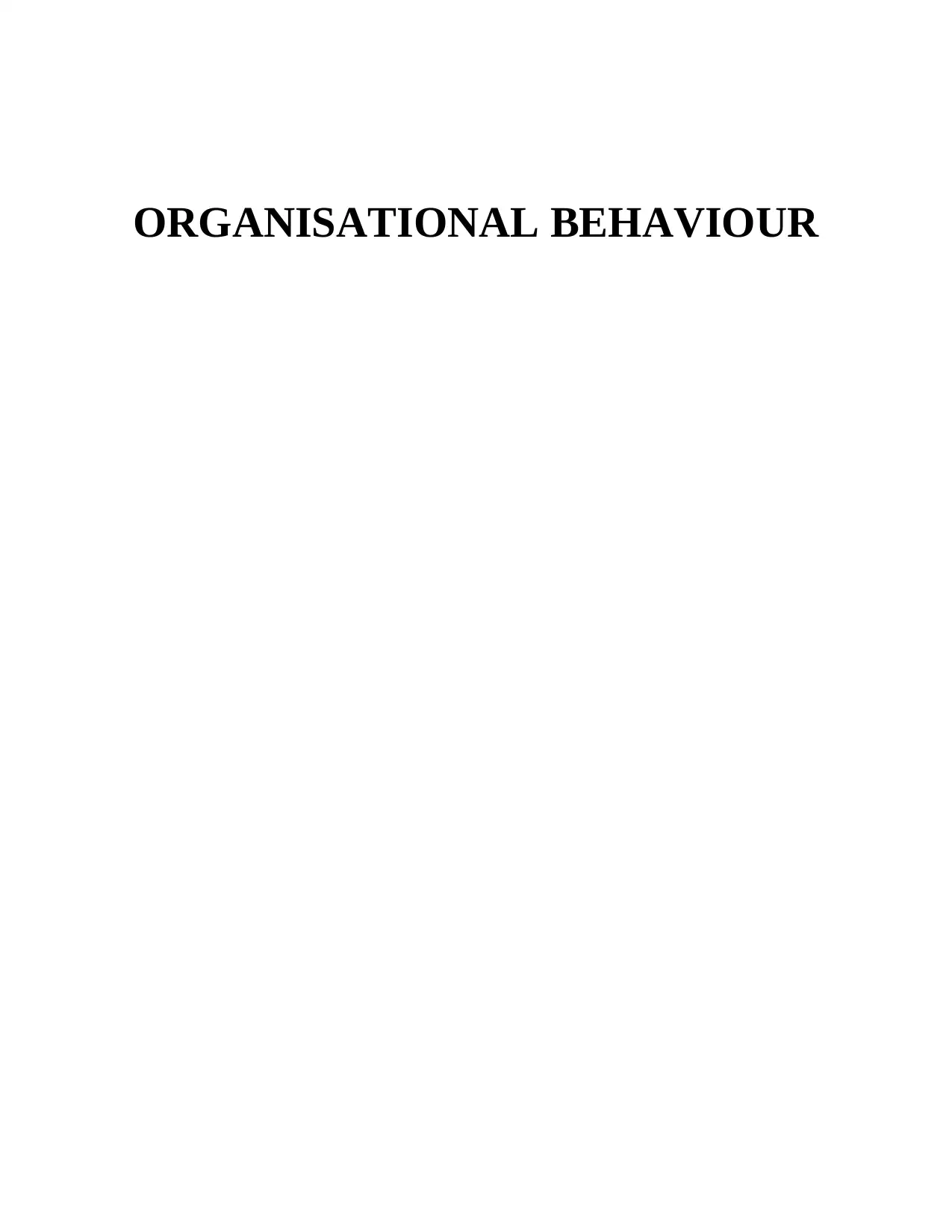
ORGANISATIONAL BEHAVIOUR
Paraphrase This Document
Need a fresh take? Get an instant paraphrase of this document with our AI Paraphraser
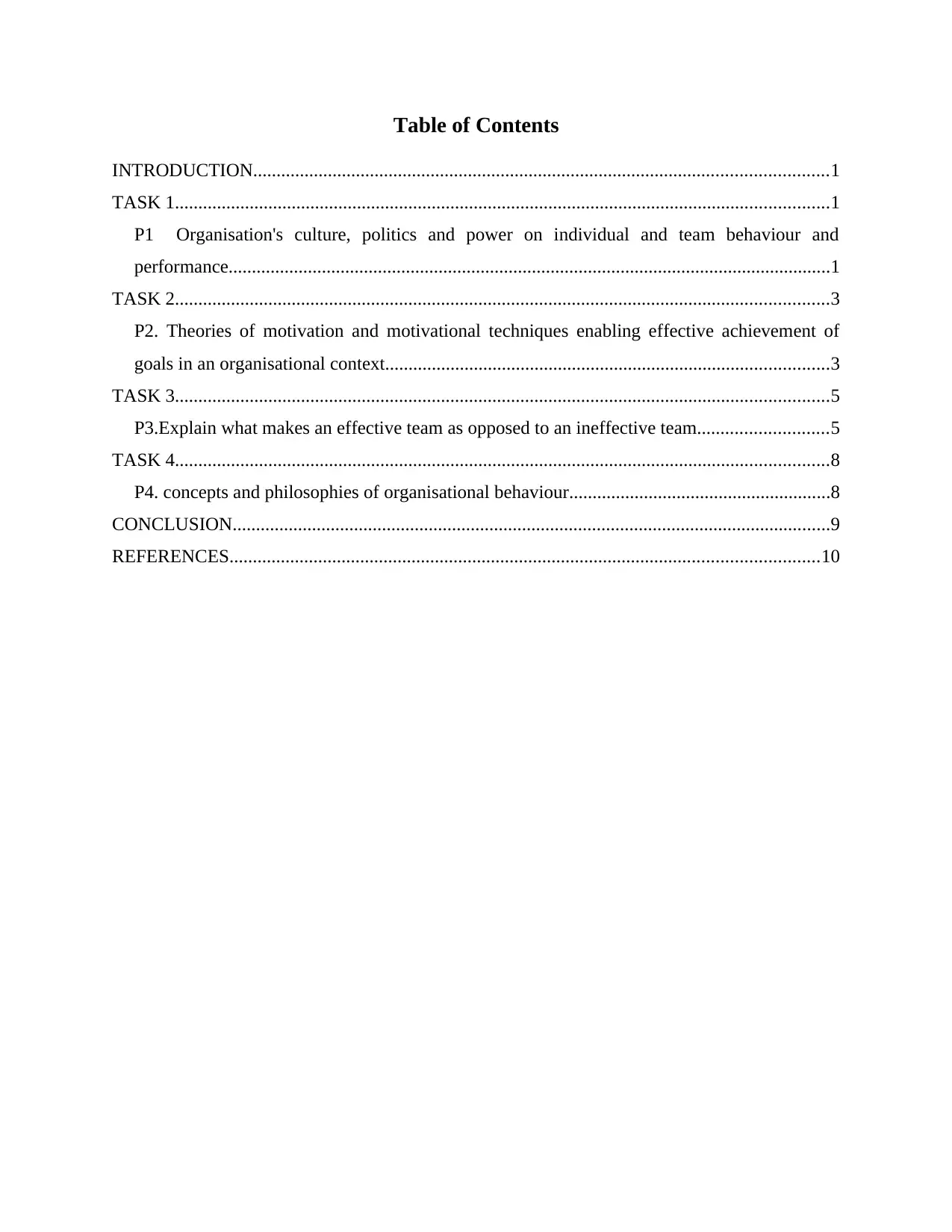
Table of Contents
INTRODUCTION...........................................................................................................................1
TASK 1............................................................................................................................................1
P1 Organisation's culture, politics and power on individual and team behaviour and
performance.................................................................................................................................1
TASK 2............................................................................................................................................3
P2. Theories of motivation and motivational techniques enabling effective achievement of
goals in an organisational context...............................................................................................3
TASK 3............................................................................................................................................5
P3.Explain what makes an effective team as opposed to an ineffective team............................5
TASK 4............................................................................................................................................8
P4. concepts and philosophies of organisational behaviour........................................................8
CONCLUSION................................................................................................................................9
REFERENCES..............................................................................................................................10
INTRODUCTION...........................................................................................................................1
TASK 1............................................................................................................................................1
P1 Organisation's culture, politics and power on individual and team behaviour and
performance.................................................................................................................................1
TASK 2............................................................................................................................................3
P2. Theories of motivation and motivational techniques enabling effective achievement of
goals in an organisational context...............................................................................................3
TASK 3............................................................................................................................................5
P3.Explain what makes an effective team as opposed to an ineffective team............................5
TASK 4............................................................................................................................................8
P4. concepts and philosophies of organisational behaviour........................................................8
CONCLUSION................................................................................................................................9
REFERENCES..............................................................................................................................10
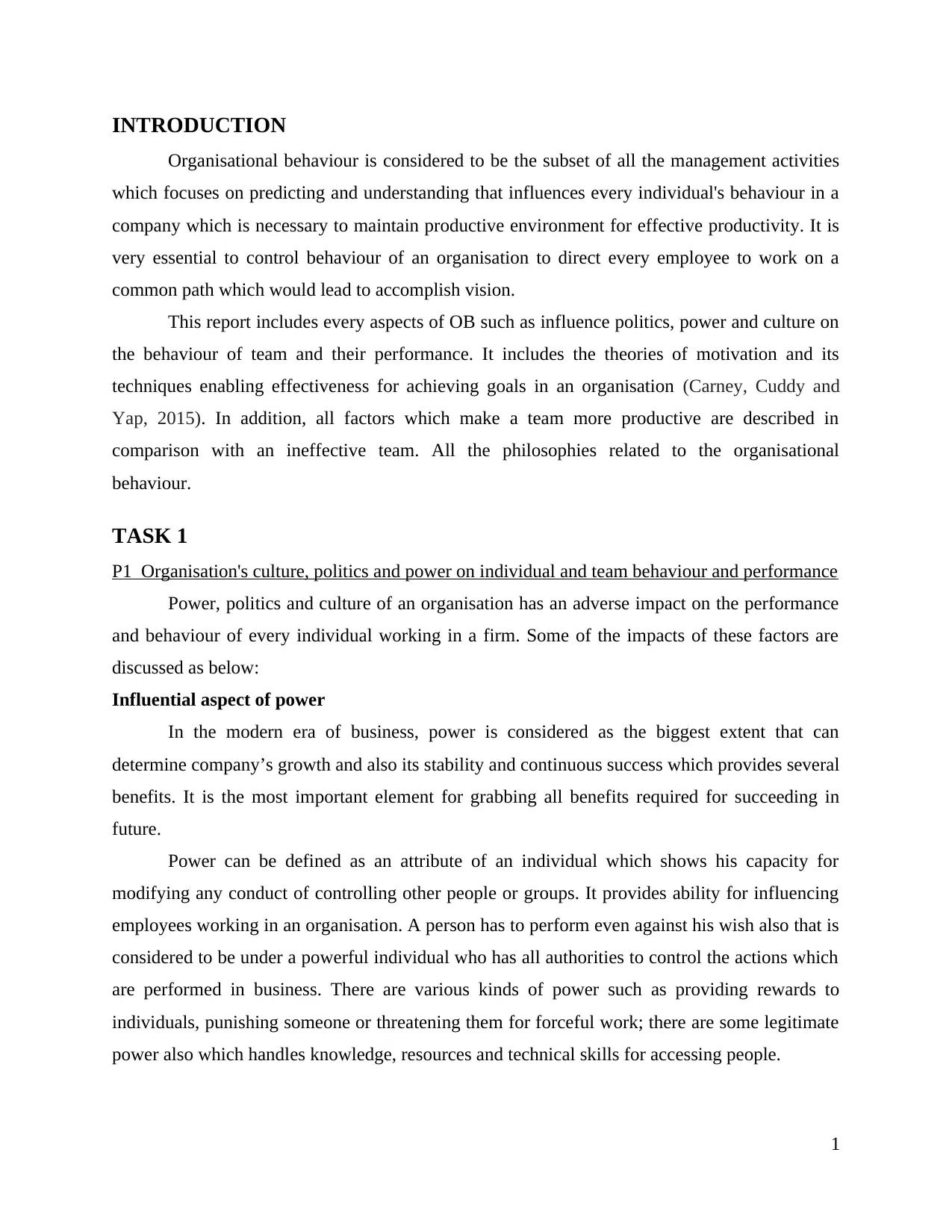
INTRODUCTION
Organisational behaviour is considered to be the subset of all the management activities
which focuses on predicting and understanding that influences every individual's behaviour in a
company which is necessary to maintain productive environment for effective productivity. It is
very essential to control behaviour of an organisation to direct every employee to work on a
common path which would lead to accomplish vision.
This report includes every aspects of OB such as influence politics, power and culture on
the behaviour of team and their performance. It includes the theories of motivation and its
techniques enabling effectiveness for achieving goals in an organisation (Carney, Cuddy and
Yap, 2015). In addition, all factors which make a team more productive are described in
comparison with an ineffective team. All the philosophies related to the organisational
behaviour.
TASK 1
P1 Organisation's culture, politics and power on individual and team behaviour and performance
Power, politics and culture of an organisation has an adverse impact on the performance
and behaviour of every individual working in a firm. Some of the impacts of these factors are
discussed as below:
Influential aspect of power
In the modern era of business, power is considered as the biggest extent that can
determine company’s growth and also its stability and continuous success which provides several
benefits. It is the most important element for grabbing all benefits required for succeeding in
future.
Power can be defined as an attribute of an individual which shows his capacity for
modifying any conduct of controlling other people or groups. It provides ability for influencing
employees working in an organisation. A person has to perform even against his wish also that is
considered to be under a powerful individual who has all authorities to control the actions which
are performed in business. There are various kinds of power such as providing rewards to
individuals, punishing someone or threatening them for forceful work; there are some legitimate
power also which handles knowledge, resources and technical skills for accessing people.
1
Organisational behaviour is considered to be the subset of all the management activities
which focuses on predicting and understanding that influences every individual's behaviour in a
company which is necessary to maintain productive environment for effective productivity. It is
very essential to control behaviour of an organisation to direct every employee to work on a
common path which would lead to accomplish vision.
This report includes every aspects of OB such as influence politics, power and culture on
the behaviour of team and their performance. It includes the theories of motivation and its
techniques enabling effectiveness for achieving goals in an organisation (Carney, Cuddy and
Yap, 2015). In addition, all factors which make a team more productive are described in
comparison with an ineffective team. All the philosophies related to the organisational
behaviour.
TASK 1
P1 Organisation's culture, politics and power on individual and team behaviour and performance
Power, politics and culture of an organisation has an adverse impact on the performance
and behaviour of every individual working in a firm. Some of the impacts of these factors are
discussed as below:
Influential aspect of power
In the modern era of business, power is considered as the biggest extent that can
determine company’s growth and also its stability and continuous success which provides several
benefits. It is the most important element for grabbing all benefits required for succeeding in
future.
Power can be defined as an attribute of an individual which shows his capacity for
modifying any conduct of controlling other people or groups. It provides ability for influencing
employees working in an organisation. A person has to perform even against his wish also that is
considered to be under a powerful individual who has all authorities to control the actions which
are performed in business. There are various kinds of power such as providing rewards to
individuals, punishing someone or threatening them for forceful work; there are some legitimate
power also which handles knowledge, resources and technical skills for accessing people.
1
⊘ This is a preview!⊘
Do you want full access?
Subscribe today to unlock all pages.

Trusted by 1+ million students worldwide
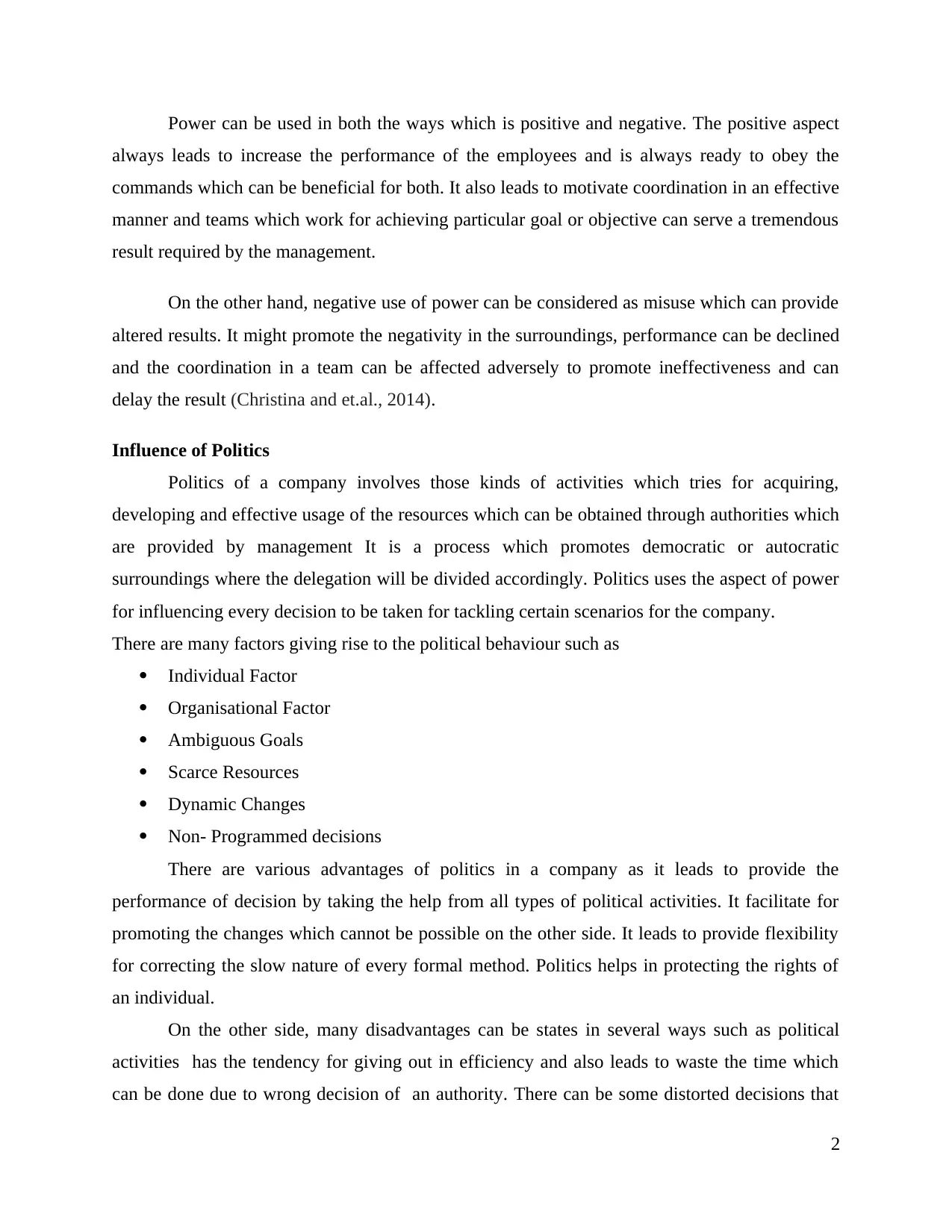
Power can be used in both the ways which is positive and negative. The positive aspect
always leads to increase the performance of the employees and is always ready to obey the
commands which can be beneficial for both. It also leads to motivate coordination in an effective
manner and teams which work for achieving particular goal or objective can serve a tremendous
result required by the management.
On the other hand, negative use of power can be considered as misuse which can provide
altered results. It might promote the negativity in the surroundings, performance can be declined
and the coordination in a team can be affected adversely to promote ineffectiveness and can
delay the result (Christina and et.al., 2014).
Influence of Politics
Politics of a company involves those kinds of activities which tries for acquiring,
developing and effective usage of the resources which can be obtained through authorities which
are provided by management It is a process which promotes democratic or autocratic
surroundings where the delegation will be divided accordingly. Politics uses the aspect of power
for influencing every decision to be taken for tackling certain scenarios for the company.
There are many factors giving rise to the political behaviour such as
Individual Factor
Organisational Factor
Ambiguous Goals
Scarce Resources
Dynamic Changes
Non- Programmed decisions
There are various advantages of politics in a company as it leads to provide the
performance of decision by taking the help from all types of political activities. It facilitate for
promoting the changes which cannot be possible on the other side. It leads to provide flexibility
for correcting the slow nature of every formal method. Politics helps in protecting the rights of
an individual.
On the other side, many disadvantages can be states in several ways such as political
activities has the tendency for giving out in efficiency and also leads to waste the time which
can be done due to wrong decision of an authority. There can be some distorted decisions that
2
always leads to increase the performance of the employees and is always ready to obey the
commands which can be beneficial for both. It also leads to motivate coordination in an effective
manner and teams which work for achieving particular goal or objective can serve a tremendous
result required by the management.
On the other hand, negative use of power can be considered as misuse which can provide
altered results. It might promote the negativity in the surroundings, performance can be declined
and the coordination in a team can be affected adversely to promote ineffectiveness and can
delay the result (Christina and et.al., 2014).
Influence of Politics
Politics of a company involves those kinds of activities which tries for acquiring,
developing and effective usage of the resources which can be obtained through authorities which
are provided by management It is a process which promotes democratic or autocratic
surroundings where the delegation will be divided accordingly. Politics uses the aspect of power
for influencing every decision to be taken for tackling certain scenarios for the company.
There are many factors giving rise to the political behaviour such as
Individual Factor
Organisational Factor
Ambiguous Goals
Scarce Resources
Dynamic Changes
Non- Programmed decisions
There are various advantages of politics in a company as it leads to provide the
performance of decision by taking the help from all types of political activities. It facilitate for
promoting the changes which cannot be possible on the other side. It leads to provide flexibility
for correcting the slow nature of every formal method. Politics helps in protecting the rights of
an individual.
On the other side, many disadvantages can be states in several ways such as political
activities has the tendency for giving out in efficiency and also leads to waste the time which
can be done due to wrong decision of an authority. There can be some distorted decisions that
2
Paraphrase This Document
Need a fresh take? Get an instant paraphrase of this document with our AI Paraphraser
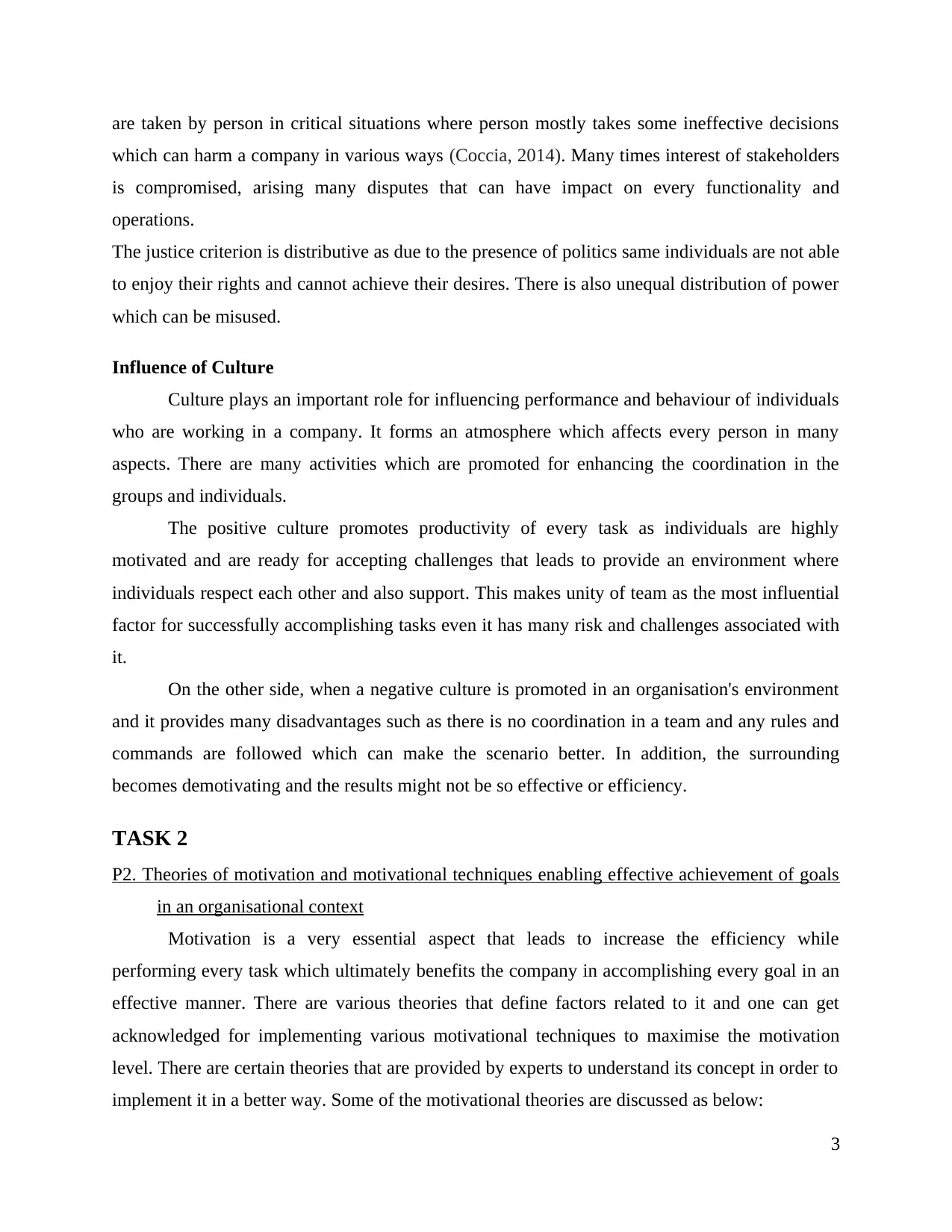
are taken by person in critical situations where person mostly takes some ineffective decisions
which can harm a company in various ways (Coccia, 2014). Many times interest of stakeholders
is compromised, arising many disputes that can have impact on every functionality and
operations.
The justice criterion is distributive as due to the presence of politics same individuals are not able
to enjoy their rights and cannot achieve their desires. There is also unequal distribution of power
which can be misused.
Influence of Culture
Culture plays an important role for influencing performance and behaviour of individuals
who are working in a company. It forms an atmosphere which affects every person in many
aspects. There are many activities which are promoted for enhancing the coordination in the
groups and individuals.
The positive culture promotes productivity of every task as individuals are highly
motivated and are ready for accepting challenges that leads to provide an environment where
individuals respect each other and also support. This makes unity of team as the most influential
factor for successfully accomplishing tasks even it has many risk and challenges associated with
it.
On the other side, when a negative culture is promoted in an organisation's environment
and it provides many disadvantages such as there is no coordination in a team and any rules and
commands are followed which can make the scenario better. In addition, the surrounding
becomes demotivating and the results might not be so effective or efficiency.
TASK 2
P2. Theories of motivation and motivational techniques enabling effective achievement of goals
in an organisational context
Motivation is a very essential aspect that leads to increase the efficiency while
performing every task which ultimately benefits the company in accomplishing every goal in an
effective manner. There are various theories that define factors related to it and one can get
acknowledged for implementing various motivational techniques to maximise the motivation
level. There are certain theories that are provided by experts to understand its concept in order to
implement it in a better way. Some of the motivational theories are discussed as below:
3
which can harm a company in various ways (Coccia, 2014). Many times interest of stakeholders
is compromised, arising many disputes that can have impact on every functionality and
operations.
The justice criterion is distributive as due to the presence of politics same individuals are not able
to enjoy their rights and cannot achieve their desires. There is also unequal distribution of power
which can be misused.
Influence of Culture
Culture plays an important role for influencing performance and behaviour of individuals
who are working in a company. It forms an atmosphere which affects every person in many
aspects. There are many activities which are promoted for enhancing the coordination in the
groups and individuals.
The positive culture promotes productivity of every task as individuals are highly
motivated and are ready for accepting challenges that leads to provide an environment where
individuals respect each other and also support. This makes unity of team as the most influential
factor for successfully accomplishing tasks even it has many risk and challenges associated with
it.
On the other side, when a negative culture is promoted in an organisation's environment
and it provides many disadvantages such as there is no coordination in a team and any rules and
commands are followed which can make the scenario better. In addition, the surrounding
becomes demotivating and the results might not be so effective or efficiency.
TASK 2
P2. Theories of motivation and motivational techniques enabling effective achievement of goals
in an organisational context
Motivation is a very essential aspect that leads to increase the efficiency while
performing every task which ultimately benefits the company in accomplishing every goal in an
effective manner. There are various theories that define factors related to it and one can get
acknowledged for implementing various motivational techniques to maximise the motivation
level. There are certain theories that are provided by experts to understand its concept in order to
implement it in a better way. Some of the motivational theories are discussed as below:
3
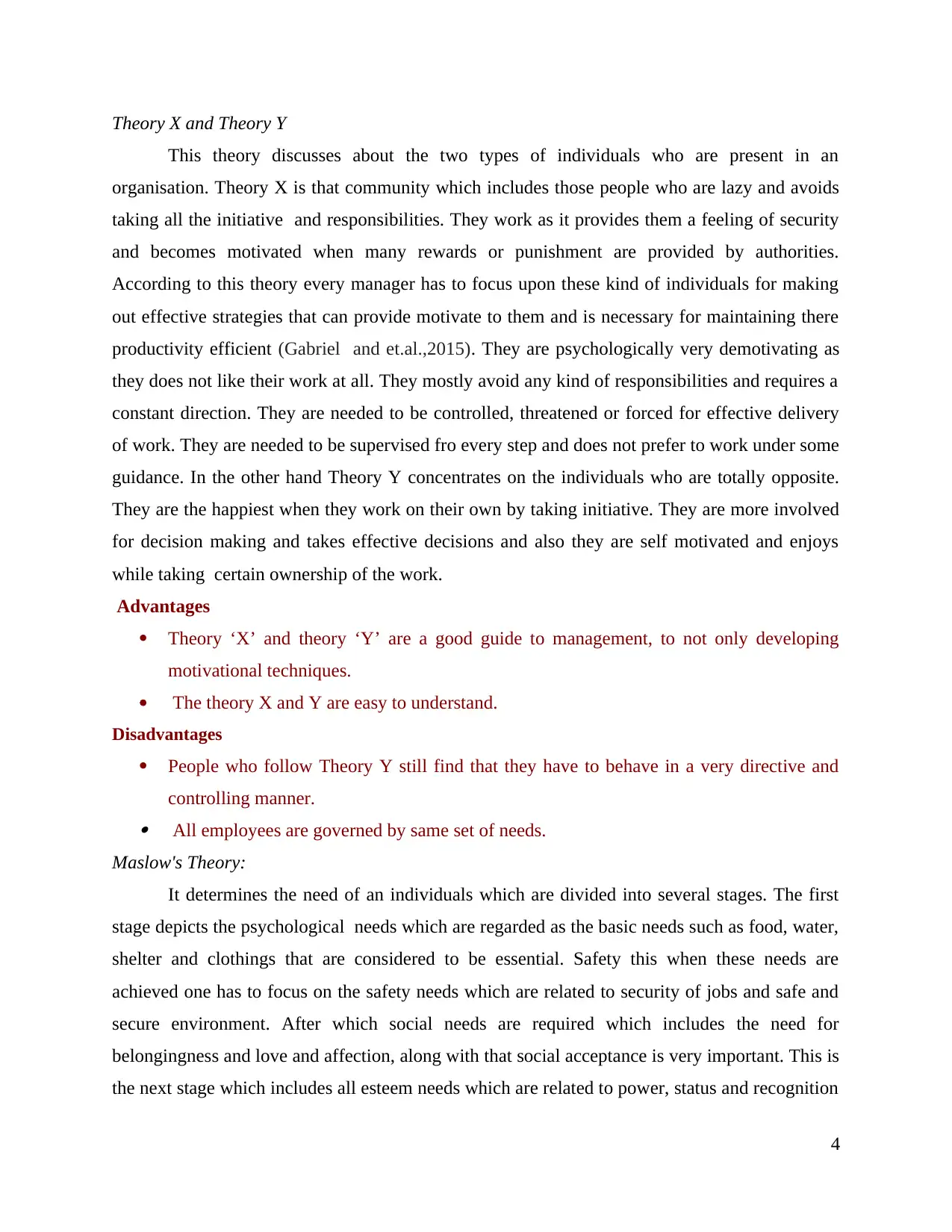
Theory X and Theory Y
This theory discusses about the two types of individuals who are present in an
organisation. Theory X is that community which includes those people who are lazy and avoids
taking all the initiative and responsibilities. They work as it provides them a feeling of security
and becomes motivated when many rewards or punishment are provided by authorities.
According to this theory every manager has to focus upon these kind of individuals for making
out effective strategies that can provide motivate to them and is necessary for maintaining there
productivity efficient (Gabriel and et.al.,2015). They are psychologically very demotivating as
they does not like their work at all. They mostly avoid any kind of responsibilities and requires a
constant direction. They are needed to be controlled, threatened or forced for effective delivery
of work. They are needed to be supervised fro every step and does not prefer to work under some
guidance. In the other hand Theory Y concentrates on the individuals who are totally opposite.
They are the happiest when they work on their own by taking initiative. They are more involved
for decision making and takes effective decisions and also they are self motivated and enjoys
while taking certain ownership of the work.
Advantages
Theory ‘X’ and theory ‘Y’ are a good guide to management, to not only developing
motivational techniques.
The theory X and Y are easy to understand.
Disadvantages
People who follow Theory Y still find that they have to behave in a very directive and
controlling manner. All employees are governed by same set of needs.
Maslow's Theory:
It determines the need of an individuals which are divided into several stages. The first
stage depicts the psychological needs which are regarded as the basic needs such as food, water,
shelter and clothings that are considered to be essential. Safety this when these needs are
achieved one has to focus on the safety needs which are related to security of jobs and safe and
secure environment. After which social needs are required which includes the need for
belongingness and love and affection, along with that social acceptance is very important. This is
the next stage which includes all esteem needs which are related to power, status and recognition
4
This theory discusses about the two types of individuals who are present in an
organisation. Theory X is that community which includes those people who are lazy and avoids
taking all the initiative and responsibilities. They work as it provides them a feeling of security
and becomes motivated when many rewards or punishment are provided by authorities.
According to this theory every manager has to focus upon these kind of individuals for making
out effective strategies that can provide motivate to them and is necessary for maintaining there
productivity efficient (Gabriel and et.al.,2015). They are psychologically very demotivating as
they does not like their work at all. They mostly avoid any kind of responsibilities and requires a
constant direction. They are needed to be controlled, threatened or forced for effective delivery
of work. They are needed to be supervised fro every step and does not prefer to work under some
guidance. In the other hand Theory Y concentrates on the individuals who are totally opposite.
They are the happiest when they work on their own by taking initiative. They are more involved
for decision making and takes effective decisions and also they are self motivated and enjoys
while taking certain ownership of the work.
Advantages
Theory ‘X’ and theory ‘Y’ are a good guide to management, to not only developing
motivational techniques.
The theory X and Y are easy to understand.
Disadvantages
People who follow Theory Y still find that they have to behave in a very directive and
controlling manner. All employees are governed by same set of needs.
Maslow's Theory:
It determines the need of an individuals which are divided into several stages. The first
stage depicts the psychological needs which are regarded as the basic needs such as food, water,
shelter and clothings that are considered to be essential. Safety this when these needs are
achieved one has to focus on the safety needs which are related to security of jobs and safe and
secure environment. After which social needs are required which includes the need for
belongingness and love and affection, along with that social acceptance is very important. This is
the next stage which includes all esteem needs which are related to power, status and recognition
4
⊘ This is a preview!⊘
Do you want full access?
Subscribe today to unlock all pages.

Trusted by 1+ million students worldwide
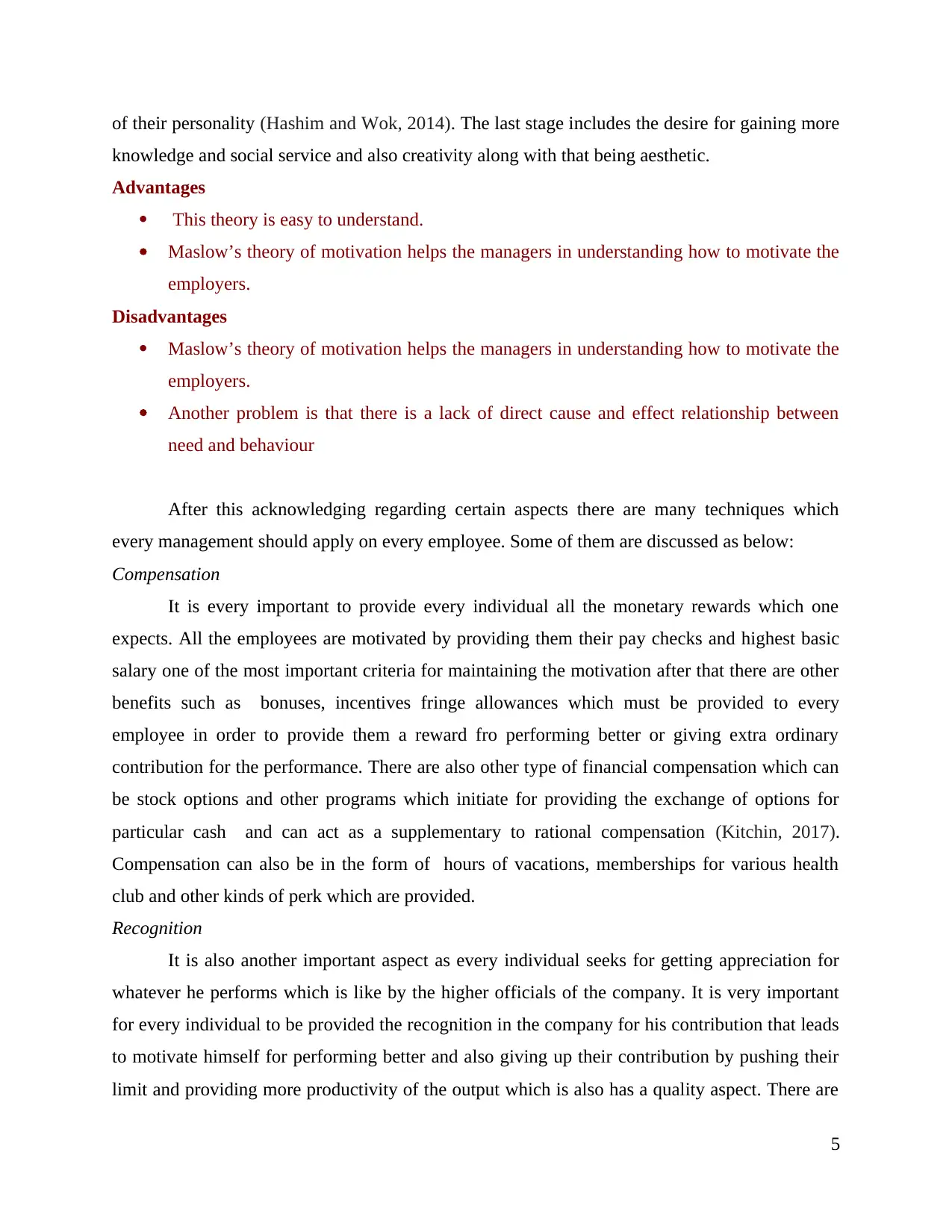
of their personality (Hashim and Wok, 2014). The last stage includes the desire for gaining more
knowledge and social service and also creativity along with that being aesthetic.
Advantages
This theory is easy to understand.
Maslow’s theory of motivation helps the managers in understanding how to motivate the
employers.
Disadvantages
Maslow’s theory of motivation helps the managers in understanding how to motivate the
employers.
Another problem is that there is a lack of direct cause and effect relationship between
need and behaviour
After this acknowledging regarding certain aspects there are many techniques which
every management should apply on every employee. Some of them are discussed as below:
Compensation
It is every important to provide every individual all the monetary rewards which one
expects. All the employees are motivated by providing them their pay checks and highest basic
salary one of the most important criteria for maintaining the motivation after that there are other
benefits such as bonuses, incentives fringe allowances which must be provided to every
employee in order to provide them a reward fro performing better or giving extra ordinary
contribution for the performance. There are also other type of financial compensation which can
be stock options and other programs which initiate for providing the exchange of options for
particular cash and can act as a supplementary to rational compensation (Kitchin, 2017).
Compensation can also be in the form of hours of vacations, memberships for various health
club and other kinds of perk which are provided.
Recognition
It is also another important aspect as every individual seeks for getting appreciation for
whatever he performs which is like by the higher officials of the company. It is very important
for every individual to be provided the recognition in the company for his contribution that leads
to motivate himself for performing better and also giving up their contribution by pushing their
limit and providing more productivity of the output which is also has a quality aspect. There are
5
knowledge and social service and also creativity along with that being aesthetic.
Advantages
This theory is easy to understand.
Maslow’s theory of motivation helps the managers in understanding how to motivate the
employers.
Disadvantages
Maslow’s theory of motivation helps the managers in understanding how to motivate the
employers.
Another problem is that there is a lack of direct cause and effect relationship between
need and behaviour
After this acknowledging regarding certain aspects there are many techniques which
every management should apply on every employee. Some of them are discussed as below:
Compensation
It is every important to provide every individual all the monetary rewards which one
expects. All the employees are motivated by providing them their pay checks and highest basic
salary one of the most important criteria for maintaining the motivation after that there are other
benefits such as bonuses, incentives fringe allowances which must be provided to every
employee in order to provide them a reward fro performing better or giving extra ordinary
contribution for the performance. There are also other type of financial compensation which can
be stock options and other programs which initiate for providing the exchange of options for
particular cash and can act as a supplementary to rational compensation (Kitchin, 2017).
Compensation can also be in the form of hours of vacations, memberships for various health
club and other kinds of perk which are provided.
Recognition
It is also another important aspect as every individual seeks for getting appreciation for
whatever he performs which is like by the higher officials of the company. It is very important
for every individual to be provided the recognition in the company for his contribution that leads
to motivate himself for performing better and also giving up their contribution by pushing their
limit and providing more productivity of the output which is also has a quality aspect. There are
5
Paraphrase This Document
Need a fresh take? Get an instant paraphrase of this document with our AI Paraphraser
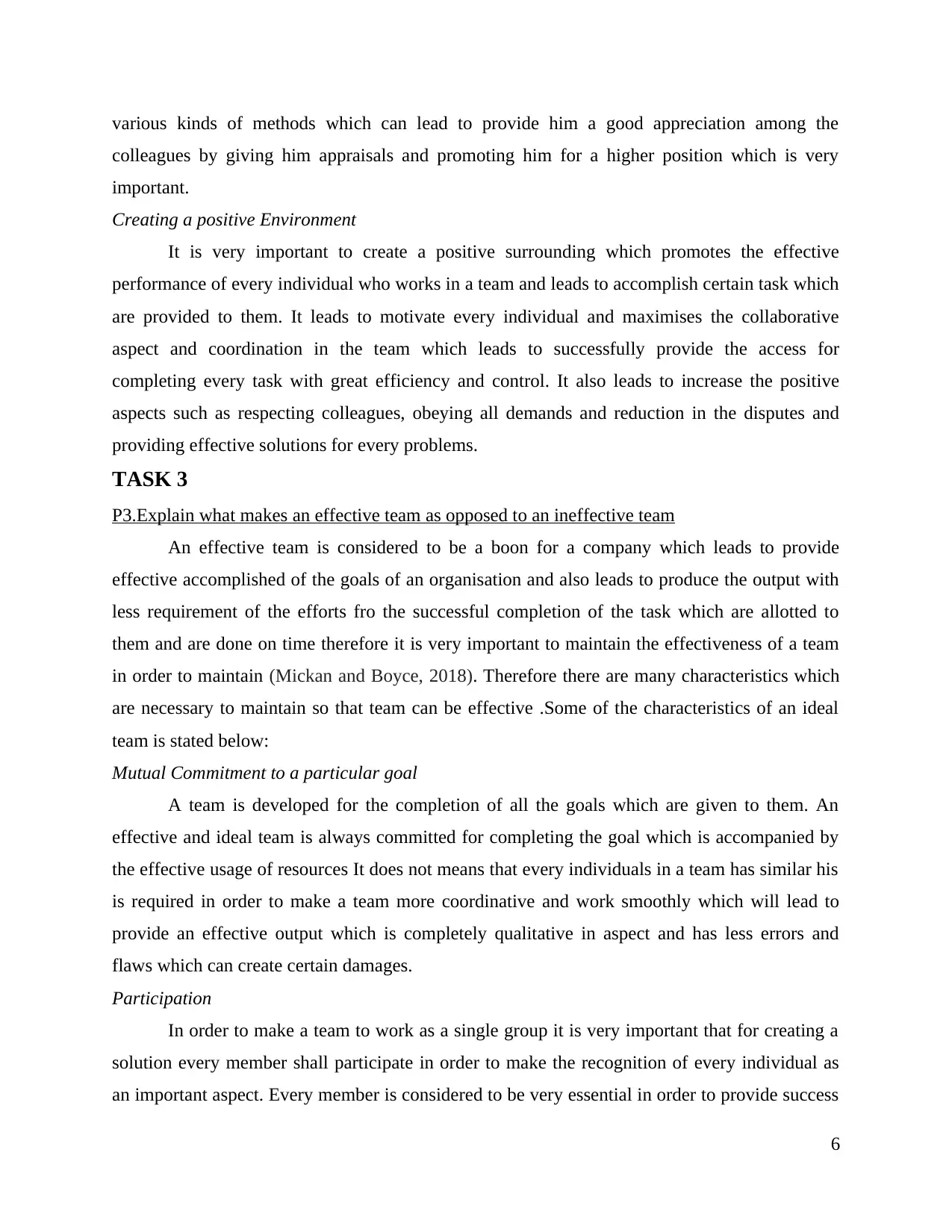
various kinds of methods which can lead to provide him a good appreciation among the
colleagues by giving him appraisals and promoting him for a higher position which is very
important.
Creating a positive Environment
It is very important to create a positive surrounding which promotes the effective
performance of every individual who works in a team and leads to accomplish certain task which
are provided to them. It leads to motivate every individual and maximises the collaborative
aspect and coordination in the team which leads to successfully provide the access for
completing every task with great efficiency and control. It also leads to increase the positive
aspects such as respecting colleagues, obeying all demands and reduction in the disputes and
providing effective solutions for every problems.
TASK 3
P3.Explain what makes an effective team as opposed to an ineffective team
An effective team is considered to be a boon for a company which leads to provide
effective accomplished of the goals of an organisation and also leads to produce the output with
less requirement of the efforts fro the successful completion of the task which are allotted to
them and are done on time therefore it is very important to maintain the effectiveness of a team
in order to maintain (Mickan and Boyce, 2018). Therefore there are many characteristics which
are necessary to maintain so that team can be effective .Some of the characteristics of an ideal
team is stated below:
Mutual Commitment to a particular goal
A team is developed for the completion of all the goals which are given to them. An
effective and ideal team is always committed for completing the goal which is accompanied by
the effective usage of resources It does not means that every individuals in a team has similar his
is required in order to make a team more coordinative and work smoothly which will lead to
provide an effective output which is completely qualitative in aspect and has less errors and
flaws which can create certain damages.
Participation
In order to make a team to work as a single group it is very important that for creating a
solution every member shall participate in order to make the recognition of every individual as
an important aspect. Every member is considered to be very essential in order to provide success
6
colleagues by giving him appraisals and promoting him for a higher position which is very
important.
Creating a positive Environment
It is very important to create a positive surrounding which promotes the effective
performance of every individual who works in a team and leads to accomplish certain task which
are provided to them. It leads to motivate every individual and maximises the collaborative
aspect and coordination in the team which leads to successfully provide the access for
completing every task with great efficiency and control. It also leads to increase the positive
aspects such as respecting colleagues, obeying all demands and reduction in the disputes and
providing effective solutions for every problems.
TASK 3
P3.Explain what makes an effective team as opposed to an ineffective team
An effective team is considered to be a boon for a company which leads to provide
effective accomplished of the goals of an organisation and also leads to produce the output with
less requirement of the efforts fro the successful completion of the task which are allotted to
them and are done on time therefore it is very important to maintain the effectiveness of a team
in order to maintain (Mickan and Boyce, 2018). Therefore there are many characteristics which
are necessary to maintain so that team can be effective .Some of the characteristics of an ideal
team is stated below:
Mutual Commitment to a particular goal
A team is developed for the completion of all the goals which are given to them. An
effective and ideal team is always committed for completing the goal which is accompanied by
the effective usage of resources It does not means that every individuals in a team has similar his
is required in order to make a team more coordinative and work smoothly which will lead to
provide an effective output which is completely qualitative in aspect and has less errors and
flaws which can create certain damages.
Participation
In order to make a team to work as a single group it is very important that for creating a
solution every member shall participate in order to make the recognition of every individual as
an important aspect. Every member is considered to be very essential in order to provide success
6
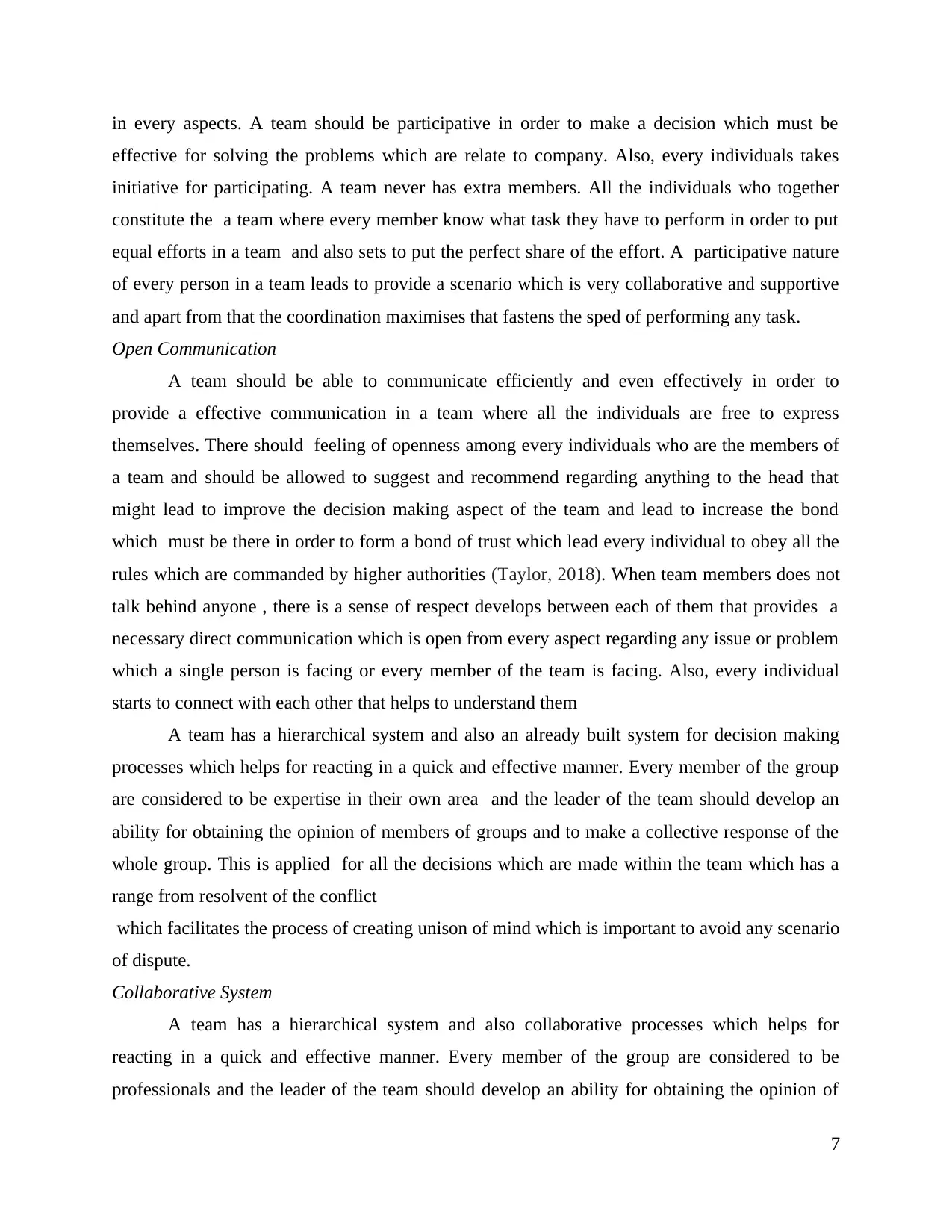
in every aspects. A team should be participative in order to make a decision which must be
effective for solving the problems which are relate to company. Also, every individuals takes
initiative for participating. A team never has extra members. All the individuals who together
constitute the a team where every member know what task they have to perform in order to put
equal efforts in a team and also sets to put the perfect share of the effort. A participative nature
of every person in a team leads to provide a scenario which is very collaborative and supportive
and apart from that the coordination maximises that fastens the sped of performing any task.
Open Communication
A team should be able to communicate efficiently and even effectively in order to
provide a effective communication in a team where all the individuals are free to express
themselves. There should feeling of openness among every individuals who are the members of
a team and should be allowed to suggest and recommend regarding anything to the head that
might lead to improve the decision making aspect of the team and lead to increase the bond
which must be there in order to form a bond of trust which lead every individual to obey all the
rules which are commanded by higher authorities (Taylor, 2018). When team members does not
talk behind anyone , there is a sense of respect develops between each of them that provides a
necessary direct communication which is open from every aspect regarding any issue or problem
which a single person is facing or every member of the team is facing. Also, every individual
starts to connect with each other that helps to understand them
A team has a hierarchical system and also an already built system for decision making
processes which helps for reacting in a quick and effective manner. Every member of the group
are considered to be expertise in their own area and the leader of the team should develop an
ability for obtaining the opinion of members of groups and to make a collective response of the
whole group. This is applied for all the decisions which are made within the team which has a
range from resolvent of the conflict
which facilitates the process of creating unison of mind which is important to avoid any scenario
of dispute.
Collaborative System
A team has a hierarchical system and also collaborative processes which helps for
reacting in a quick and effective manner. Every member of the group are considered to be
professionals and the leader of the team should develop an ability for obtaining the opinion of
7
effective for solving the problems which are relate to company. Also, every individuals takes
initiative for participating. A team never has extra members. All the individuals who together
constitute the a team where every member know what task they have to perform in order to put
equal efforts in a team and also sets to put the perfect share of the effort. A participative nature
of every person in a team leads to provide a scenario which is very collaborative and supportive
and apart from that the coordination maximises that fastens the sped of performing any task.
Open Communication
A team should be able to communicate efficiently and even effectively in order to
provide a effective communication in a team where all the individuals are free to express
themselves. There should feeling of openness among every individuals who are the members of
a team and should be allowed to suggest and recommend regarding anything to the head that
might lead to improve the decision making aspect of the team and lead to increase the bond
which must be there in order to form a bond of trust which lead every individual to obey all the
rules which are commanded by higher authorities (Taylor, 2018). When team members does not
talk behind anyone , there is a sense of respect develops between each of them that provides a
necessary direct communication which is open from every aspect regarding any issue or problem
which a single person is facing or every member of the team is facing. Also, every individual
starts to connect with each other that helps to understand them
A team has a hierarchical system and also an already built system for decision making
processes which helps for reacting in a quick and effective manner. Every member of the group
are considered to be expertise in their own area and the leader of the team should develop an
ability for obtaining the opinion of members of groups and to make a collective response of the
whole group. This is applied for all the decisions which are made within the team which has a
range from resolvent of the conflict
which facilitates the process of creating unison of mind which is important to avoid any scenario
of dispute.
Collaborative System
A team has a hierarchical system and also collaborative processes which helps for
reacting in a quick and effective manner. Every member of the group are considered to be
professionals and the leader of the team should develop an ability for obtaining the opinion of
7
⊘ This is a preview!⊘
Do you want full access?
Subscribe today to unlock all pages.

Trusted by 1+ million students worldwide
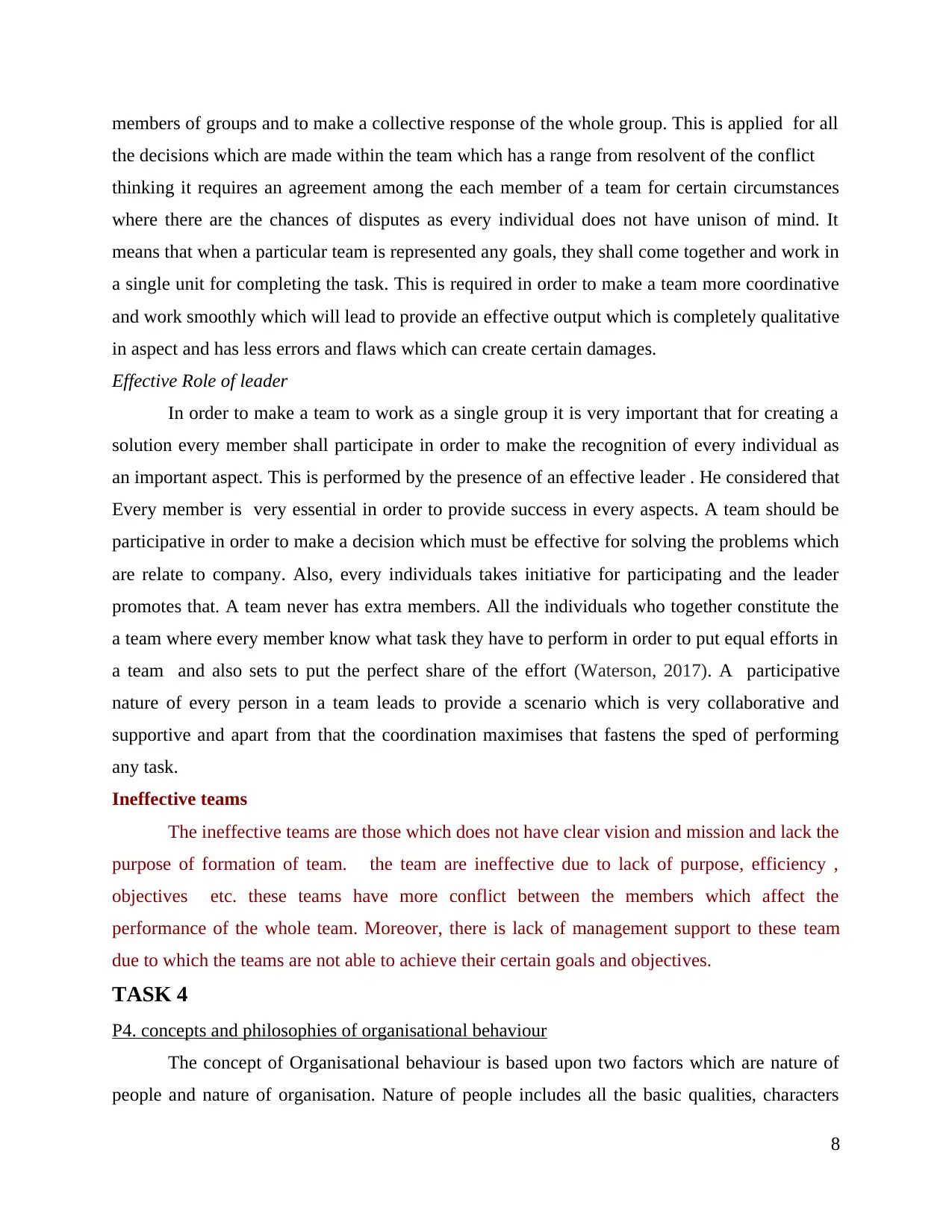
members of groups and to make a collective response of the whole group. This is applied for all
the decisions which are made within the team which has a range from resolvent of the conflict
thinking it requires an agreement among the each member of a team for certain circumstances
where there are the chances of disputes as every individual does not have unison of mind. It
means that when a particular team is represented any goals, they shall come together and work in
a single unit for completing the task. This is required in order to make a team more coordinative
and work smoothly which will lead to provide an effective output which is completely qualitative
in aspect and has less errors and flaws which can create certain damages.
Effective Role of leader
In order to make a team to work as a single group it is very important that for creating a
solution every member shall participate in order to make the recognition of every individual as
an important aspect. This is performed by the presence of an effective leader . He considered that
Every member is very essential in order to provide success in every aspects. A team should be
participative in order to make a decision which must be effective for solving the problems which
are relate to company. Also, every individuals takes initiative for participating and the leader
promotes that. A team never has extra members. All the individuals who together constitute the
a team where every member know what task they have to perform in order to put equal efforts in
a team and also sets to put the perfect share of the effort (Waterson, 2017). A participative
nature of every person in a team leads to provide a scenario which is very collaborative and
supportive and apart from that the coordination maximises that fastens the sped of performing
any task.
Ineffective teams
The ineffective teams are those which does not have clear vision and mission and lack the
purpose of formation of team. the team are ineffective due to lack of purpose, efficiency ,
objectives etc. these teams have more conflict between the members which affect the
performance of the whole team. Moreover, there is lack of management support to these team
due to which the teams are not able to achieve their certain goals and objectives.
TASK 4
P4. concepts and philosophies of organisational behaviour
The concept of Organisational behaviour is based upon two factors which are nature of
people and nature of organisation. Nature of people includes all the basic qualities, characters
8
the decisions which are made within the team which has a range from resolvent of the conflict
thinking it requires an agreement among the each member of a team for certain circumstances
where there are the chances of disputes as every individual does not have unison of mind. It
means that when a particular team is represented any goals, they shall come together and work in
a single unit for completing the task. This is required in order to make a team more coordinative
and work smoothly which will lead to provide an effective output which is completely qualitative
in aspect and has less errors and flaws which can create certain damages.
Effective Role of leader
In order to make a team to work as a single group it is very important that for creating a
solution every member shall participate in order to make the recognition of every individual as
an important aspect. This is performed by the presence of an effective leader . He considered that
Every member is very essential in order to provide success in every aspects. A team should be
participative in order to make a decision which must be effective for solving the problems which
are relate to company. Also, every individuals takes initiative for participating and the leader
promotes that. A team never has extra members. All the individuals who together constitute the
a team where every member know what task they have to perform in order to put equal efforts in
a team and also sets to put the perfect share of the effort (Waterson, 2017). A participative
nature of every person in a team leads to provide a scenario which is very collaborative and
supportive and apart from that the coordination maximises that fastens the sped of performing
any task.
Ineffective teams
The ineffective teams are those which does not have clear vision and mission and lack the
purpose of formation of team. the team are ineffective due to lack of purpose, efficiency ,
objectives etc. these teams have more conflict between the members which affect the
performance of the whole team. Moreover, there is lack of management support to these team
due to which the teams are not able to achieve their certain goals and objectives.
TASK 4
P4. concepts and philosophies of organisational behaviour
The concept of Organisational behaviour is based upon two factors which are nature of
people and nature of organisation. Nature of people includes all the basic qualities, characters
8
Paraphrase This Document
Need a fresh take? Get an instant paraphrase of this document with our AI Paraphraser
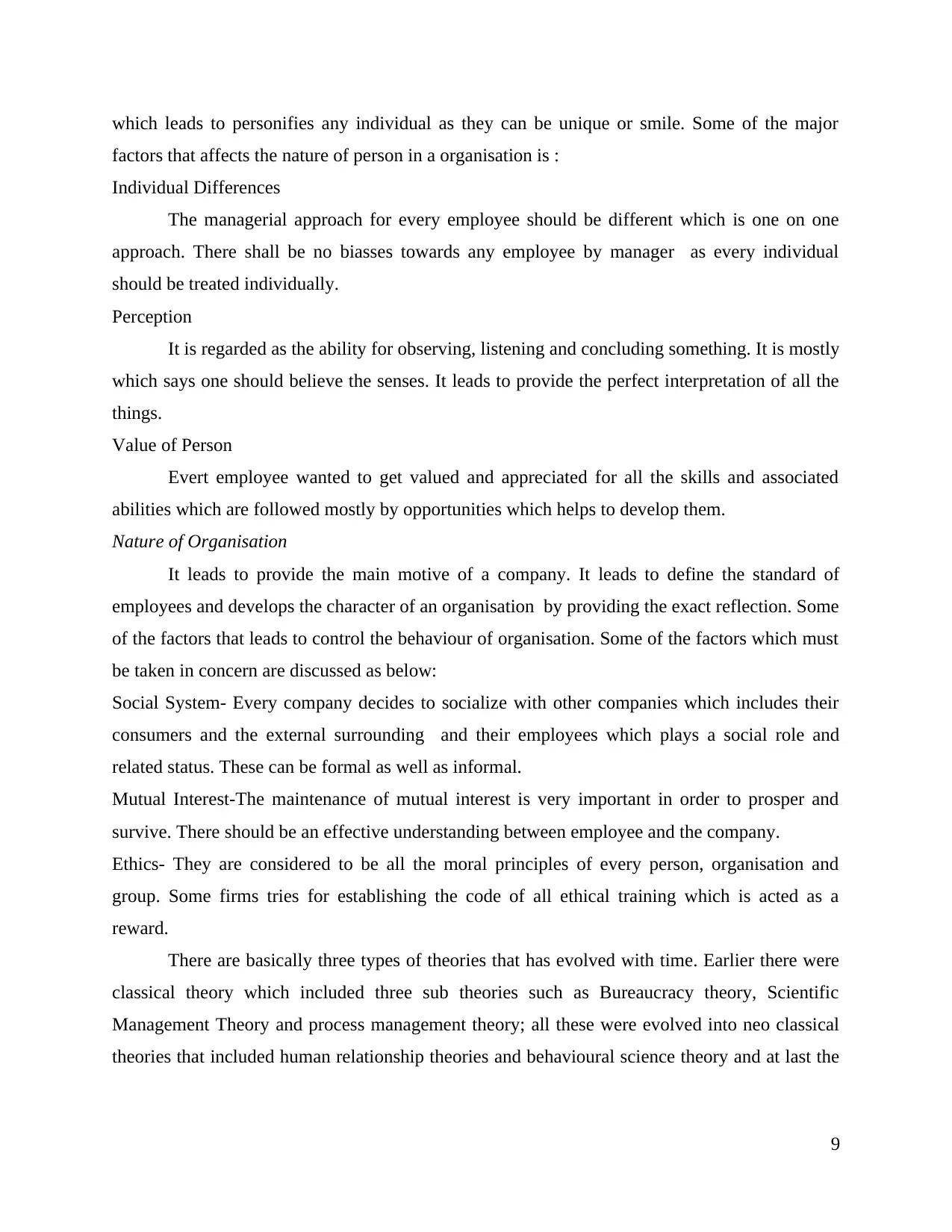
which leads to personifies any individual as they can be unique or smile. Some of the major
factors that affects the nature of person in a organisation is :
Individual Differences
The managerial approach for every employee should be different which is one on one
approach. There shall be no biasses towards any employee by manager as every individual
should be treated individually.
Perception
It is regarded as the ability for observing, listening and concluding something. It is mostly
which says one should believe the senses. It leads to provide the perfect interpretation of all the
things.
Value of Person
Evert employee wanted to get valued and appreciated for all the skills and associated
abilities which are followed mostly by opportunities which helps to develop them.
Nature of Organisation
It leads to provide the main motive of a company. It leads to define the standard of
employees and develops the character of an organisation by providing the exact reflection. Some
of the factors that leads to control the behaviour of organisation. Some of the factors which must
be taken in concern are discussed as below:
Social System- Every company decides to socialize with other companies which includes their
consumers and the external surrounding and their employees which plays a social role and
related status. These can be formal as well as informal.
Mutual Interest-The maintenance of mutual interest is very important in order to prosper and
survive. There should be an effective understanding between employee and the company.
Ethics- They are considered to be all the moral principles of every person, organisation and
group. Some firms tries for establishing the code of all ethical training which is acted as a
reward.
There are basically three types of theories that has evolved with time. Earlier there were
classical theory which included three sub theories such as Bureaucracy theory, Scientific
Management Theory and process management theory; all these were evolved into neo classical
theories that included human relationship theories and behavioural science theory and at last the
9
factors that affects the nature of person in a organisation is :
Individual Differences
The managerial approach for every employee should be different which is one on one
approach. There shall be no biasses towards any employee by manager as every individual
should be treated individually.
Perception
It is regarded as the ability for observing, listening and concluding something. It is mostly
which says one should believe the senses. It leads to provide the perfect interpretation of all the
things.
Value of Person
Evert employee wanted to get valued and appreciated for all the skills and associated
abilities which are followed mostly by opportunities which helps to develop them.
Nature of Organisation
It leads to provide the main motive of a company. It leads to define the standard of
employees and develops the character of an organisation by providing the exact reflection. Some
of the factors that leads to control the behaviour of organisation. Some of the factors which must
be taken in concern are discussed as below:
Social System- Every company decides to socialize with other companies which includes their
consumers and the external surrounding and their employees which plays a social role and
related status. These can be formal as well as informal.
Mutual Interest-The maintenance of mutual interest is very important in order to prosper and
survive. There should be an effective understanding between employee and the company.
Ethics- They are considered to be all the moral principles of every person, organisation and
group. Some firms tries for establishing the code of all ethical training which is acted as a
reward.
There are basically three types of theories that has evolved with time. Earlier there were
classical theory which included three sub theories such as Bureaucracy theory, Scientific
Management Theory and process management theory; all these were evolved into neo classical
theories that included human relationship theories and behavioural science theory and at last the
9
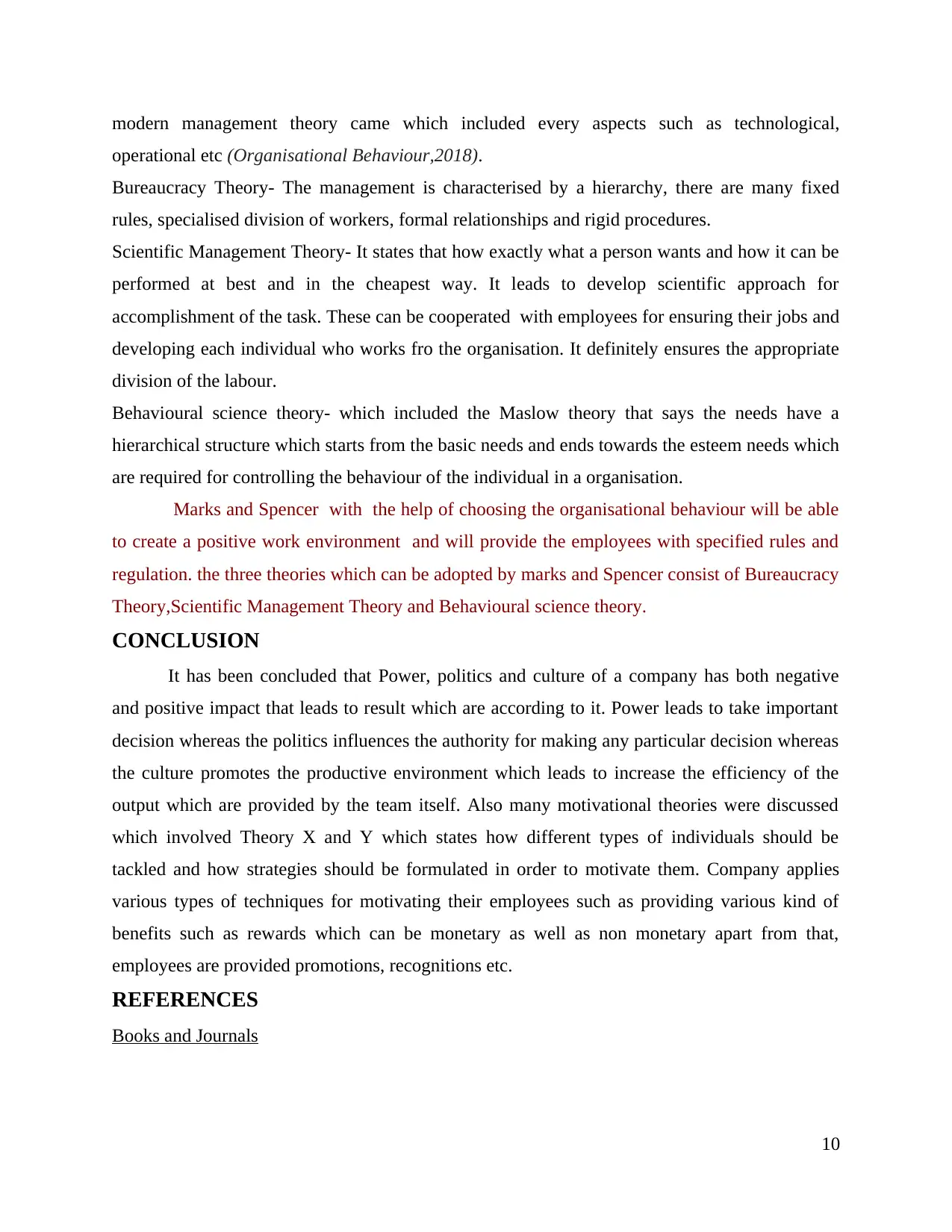
modern management theory came which included every aspects such as technological,
operational etc (Organisational Behaviour,2018).
Bureaucracy Theory- The management is characterised by a hierarchy, there are many fixed
rules, specialised division of workers, formal relationships and rigid procedures.
Scientific Management Theory- It states that how exactly what a person wants and how it can be
performed at best and in the cheapest way. It leads to develop scientific approach for
accomplishment of the task. These can be cooperated with employees for ensuring their jobs and
developing each individual who works fro the organisation. It definitely ensures the appropriate
division of the labour.
Behavioural science theory- which included the Maslow theory that says the needs have a
hierarchical structure which starts from the basic needs and ends towards the esteem needs which
are required for controlling the behaviour of the individual in a organisation.
Marks and Spencer with the help of choosing the organisational behaviour will be able
to create a positive work environment and will provide the employees with specified rules and
regulation. the three theories which can be adopted by marks and Spencer consist of Bureaucracy
Theory,Scientific Management Theory and Behavioural science theory.
CONCLUSION
It has been concluded that Power, politics and culture of a company has both negative
and positive impact that leads to result which are according to it. Power leads to take important
decision whereas the politics influences the authority for making any particular decision whereas
the culture promotes the productive environment which leads to increase the efficiency of the
output which are provided by the team itself. Also many motivational theories were discussed
which involved Theory X and Y which states how different types of individuals should be
tackled and how strategies should be formulated in order to motivate them. Company applies
various types of techniques for motivating their employees such as providing various kind of
benefits such as rewards which can be monetary as well as non monetary apart from that,
employees are provided promotions, recognitions etc.
REFERENCES
Books and Journals
10
operational etc (Organisational Behaviour,2018).
Bureaucracy Theory- The management is characterised by a hierarchy, there are many fixed
rules, specialised division of workers, formal relationships and rigid procedures.
Scientific Management Theory- It states that how exactly what a person wants and how it can be
performed at best and in the cheapest way. It leads to develop scientific approach for
accomplishment of the task. These can be cooperated with employees for ensuring their jobs and
developing each individual who works fro the organisation. It definitely ensures the appropriate
division of the labour.
Behavioural science theory- which included the Maslow theory that says the needs have a
hierarchical structure which starts from the basic needs and ends towards the esteem needs which
are required for controlling the behaviour of the individual in a organisation.
Marks and Spencer with the help of choosing the organisational behaviour will be able
to create a positive work environment and will provide the employees with specified rules and
regulation. the three theories which can be adopted by marks and Spencer consist of Bureaucracy
Theory,Scientific Management Theory and Behavioural science theory.
CONCLUSION
It has been concluded that Power, politics and culture of a company has both negative
and positive impact that leads to result which are according to it. Power leads to take important
decision whereas the politics influences the authority for making any particular decision whereas
the culture promotes the productive environment which leads to increase the efficiency of the
output which are provided by the team itself. Also many motivational theories were discussed
which involved Theory X and Y which states how different types of individuals should be
tackled and how strategies should be formulated in order to motivate them. Company applies
various types of techniques for motivating their employees such as providing various kind of
benefits such as rewards which can be monetary as well as non monetary apart from that,
employees are provided promotions, recognitions etc.
REFERENCES
Books and Journals
10
⊘ This is a preview!⊘
Do you want full access?
Subscribe today to unlock all pages.

Trusted by 1+ million students worldwide
1 out of 15
Related Documents
Your All-in-One AI-Powered Toolkit for Academic Success.
+13062052269
info@desklib.com
Available 24*7 on WhatsApp / Email
![[object Object]](/_next/static/media/star-bottom.7253800d.svg)
Unlock your academic potential
Copyright © 2020–2025 A2Z Services. All Rights Reserved. Developed and managed by ZUCOL.





